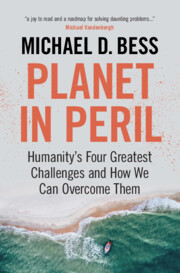Book contents
- Planet in Peril
- Reviews
- Planet in Peril
- Copyright page
- Dedication
- Epigraph
- Contents
- Fictional Vignettes
- Acknowledgements
- 1 Introduction
- Part I Existential Threats: The Four Most Pressing Dangers Facing Humankind
- Part II Strategies and Obstacles: The Solutions We Need, and What’s Preventing Them from Being Realized
- Part III Sensible Steps for Today’s World: Powerful Measures We Can Implement Right Away
- Part IV The Middle-Term Goal: New International Tools for the Late Twenty-First Century
- Part V The Long-Term Goal: Envisioning a Mature System of Global Governance for the Twenty-Second Century
- 18 Global Government in a World of Democracies and Dictatorships: What It Might Look Like in 2150
- 19 Keeping the System Accountable and Fair
- 20 Collective Military Security and Economic Sanctions: How to Handle Rogues, Cheaters, and Fanatics
- 21 What Could Go Wrong?
- 22 Conclusion
- Endnotes
- Bibliography
- Index
20 - Collective Military Security and Economic Sanctions: How to Handle Rogues, Cheaters, and Fanatics
from Part V - The Long-Term Goal: Envisioning a Mature System of Global Governance for the Twenty-Second Century
Published online by Cambridge University Press: 13 October 2022
- Planet in Peril
- Reviews
- Planet in Peril
- Copyright page
- Dedication
- Epigraph
- Contents
- Fictional Vignettes
- Acknowledgements
- 1 Introduction
- Part I Existential Threats: The Four Most Pressing Dangers Facing Humankind
- Part II Strategies and Obstacles: The Solutions We Need, and What’s Preventing Them from Being Realized
- Part III Sensible Steps for Today’s World: Powerful Measures We Can Implement Right Away
- Part IV The Middle-Term Goal: New International Tools for the Late Twenty-First Century
- Part V The Long-Term Goal: Envisioning a Mature System of Global Governance for the Twenty-Second Century
- 18 Global Government in a World of Democracies and Dictatorships: What It Might Look Like in 2150
- 19 Keeping the System Accountable and Fair
- 20 Collective Military Security and Economic Sanctions: How to Handle Rogues, Cheaters, and Fanatics
- 21 What Could Go Wrong?
- 22 Conclusion
- Endnotes
- Bibliography
- Index
Summary
Any government that wants to be taken seriously needs teeth. This chapter sketches a global security system in which national governments will still play a key role, but in which they have also worked together to create stable mechanisms of collective security. Since it is impossible to coerce nuclear-armed Great Powers through direct military action, the new global security system will need an especially robust regime of economic sanctions. If a Great Power transgresses international laws in egregious ways, such sanctions would aim to persuade the leaders of that nation that the costs of continued violations greatly exceed the benefits. In extreme cases, such sanctions could also aim to destabilize a transgressor nation’s economy so severely that its citizens would be impelled to bring about regime change from within. If such a global security system were in place for many decades, successfully keeping the peace, then incremental steps toward reductions in standing armies could be gradually undertaken. The resulting “peace dividend” could be used to further reduce global economic disparities, and to help fund the technologies for mitigating climate change.
Keywords
- Type
- Chapter
- Information
- Planet in PerilHumanity's Four Greatest Challenges and How We Can Overcome Them, pp. 301 - 317Publisher: Cambridge University PressPrint publication year: 2022



